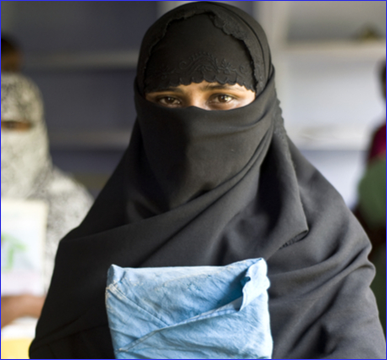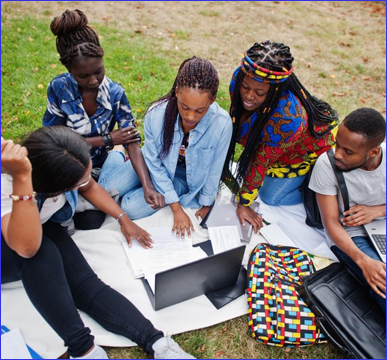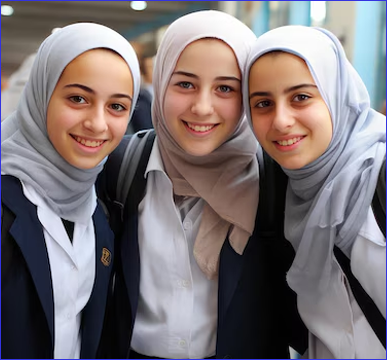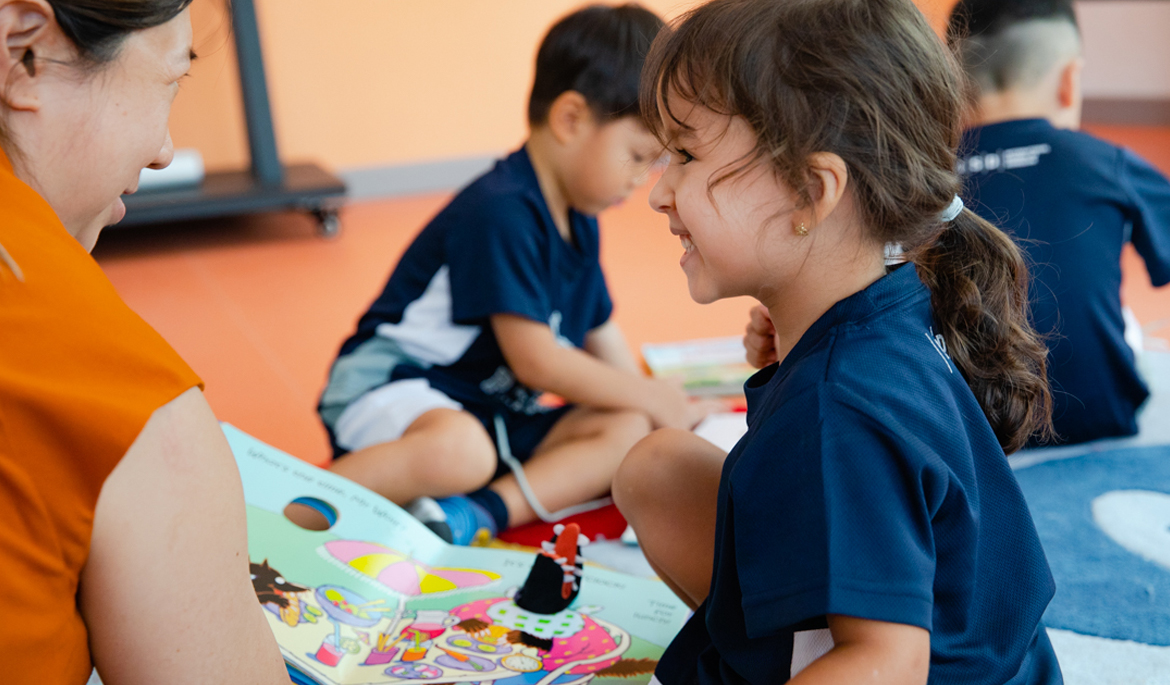The argument in favor of using filler text goes something like this: If you use real content in the Consulting Process, anytime you reach a review point you’ll end up reviewing and negotiating the content itself and not the design.
ConsultationThe structure of the US education curriculum follows a simple format – comprising of two semesters annually where credits are accumulated each year.
American curriculum consists of 13 years of education where students acquire education from pre-kindergarten all the way till twelfth grade.
The Subjects are:
These subjects are made compulsory as they provide several opportunities to students to use it. While English language allows students to interact with the world confidently, and use the technological advantages of the fast-paced world, subjects like social studies help students to understand the world around them so they can use this knowledge to navigate the world smartly and make informed decisions about issues affecting them.
The US education curriculum has smartly divided the 13 years of education in 3 broad stages:
The general age bracket for the first stage is 4 to 11 years old. During these years, the goal is to help students develop a strong understanding of the compulsory subject as well as to help them develop critical thinking leadership skills.
Then comes the second stage which is also known as the middle school. In this stage, the 11 to 14 years old students are prepared extensively for their chosen field while also focusing on making their mandatory subject areas stronger.
The last stage, commonly called American high school curriculum, consisting of 14 to 18 years old students involves students completing their certain number of credits (this varies from school to school) and getting a high school diploma. In this stage, teachers also rigorously work on the students’ English writing and speaking abilities so they are better prepared to apply in universities in English speaking countries around the globe.

The national curriculum is a set of subjects and standards used by primary and secondary schools. It covers what subjects are taught and the standards children should reach in each subject.
The national curriculum is organised into blocks of years called ‘key stages’ (KS). At the end of each key stage, the teacher will formally assess the child’s performance.
Compulsory national curriculum subjects at primary school are:
Compulsory national curriculum subjects are:
The Australian Curriculum is designed to help all students to become successful learners, confident and creative individuals, and active and informed citizens. Presented as a developmental sequence of learning from Foundation - Year 10.
The three-dimensional design of the Foundation – Year 10 Australian Curriculum recognises the importance of disciplinary knowledge, skills and understanding alongside general capabilities and cross-curriculum priorities.
Disciplinary knowledge, skills and understanding are described in the eight learning areas of the Australian Curriculum: English, Mathematics, Science, Health and Physical Education, Humanities and Social Sciences, The Arts, Technologies and Languages. The latter four learning areas have been written to include multiple subjects, reflecting custom and practice in the discipline.
Pre-School/Kindergarten Education: For the kids of age 3-6 years
Primary School Education: Starts at the age of 6 years.
Primary School education in Singapore is a six year compulsory education that begins at the age of 6 years. In the first four years, called P1-P4, also recognized as the foundation stage, the main focus is on developing the language and numerical skills, while science is taught from Primary 3. At the end of P4, students are evaluated based on their performance.
During Primary 5 and Primary 6 years of education in Singapore, known as the Orientation stage, children are put into EM1, EM2 and EM3 called Subject Based Banding System. Students in EM1 & EM2 learn English, mother tongue, i.e., Malay, Chinese or Tamil at a higher level, while the EM3 students learn Basic English Language and Mother Tongue at the basic proficiency level and basic mathematics. At the end of Primary 6, all students must attend the Primary School Leaving Exam called PSLE, that is held at a national level. The PSLE scores decide the student’s ability, i.e. their competency for secondary education.

In Primary 5 and 6, child will be offered English Language, MTL, Mathematics and Science at the foundation levels, depending on their Primary 4 school examination results. They may also be offered Higher MTL depending on their MTL results.
Based on the PSLE score, students are put in either Special/Express Course leading to ‘O’ level education or Normal (Academic) Course leading to ‘N’ level respectively in four years. Secondary school education curriculum includes subjects such as English, the Mother Tongue, Mathematics, Science and the Humanities.
PSLE Score Range: 4 - 21
Express course has two programmes:
GCE O-Level Programme and Integrated Programme.
The GCE O-Level Programme is a 4-year course leading to the GCE O-Level examination.
The Integrated Programme is a 6-year course leading to the GCE A-Level examination or International Baccalaureate Diploma or NUS High School Diploma. Students in the Integrated Programme do not need to take the GCE O-Level examination in Secondary 4.
PSLE Score Range: 21 - 25
Normal (Academic) is a 4-year or 5-year course leading to the GCE N-Level examination in Secondary 4. Some students go on to take the GCE O-Level examination in Secondary 5, and progress to junior college, Millennia Institute, polytechnic or Institute of Technical Education (ITE).
PSLE Score Range: 25 - 30
Normal (Technical) is a 4-year course leading to the N(T)-Level examination in Secondary 4.
Education system in Canada is divided into 4 main stages:
pre-primary education, primary education, secondary education, and post-secondary or tertiary education.
Pre-primary education in Canada is offered to children of 4-5 years old. The curriculum includes learning the alphabet, gaining basic pre-reading and mathematics skills, music, art, and play.
Primary Education in Canada is compulsory for all children who reached the age of 6-7 years.
Primary education consists of six grades.
It means that the students of the 6th grade are 11-12 years old.
The Subjects are:
Secondary education in Canada is divided into two levels: junior high school and high school.
Junior high school starts when a student completes the 6th grade of primary school. The junior high school consists of two years that include the 7th and 8th grade. The main aim of the junior high school is to prepare students for the next level – high school and post-secondary education. Most of the subjects are similar to primary school but the difficulty increases substantially. Also, there are some new subjects in the curriculum, such as foreign language instruction.
High school education starts when students successfully complete the 8th grade. High school program consists of 4 years and involves students from the age of 14-15 to 17-18. The whole school education in Canada usually consists of 11 grades. The curriculum in high schools requires students to gain skills that will help them to succeed vocationally after the graduation or to get ready for college or university entrance exams. Each province in Canada provides students with a variety of programs, including vocational and academic programs.
After a student graduates from a high school, student can apply to the college or university. Colleges in Canada are usually technical, applied arts, or applied science schools that provide graduates with vocational certificates, diplomas, and associate degrees.
The IB is an international qualification where there is a worldwide standardised curriculum, permitting students to transfer from a school in one country to another country.
There are four IB programmes, which are age related:
The Curriculum Framework encompasses five essential elements which balance knowledge and skills, the development of conceptual understanding, a demonstration of positive attitudes and taking responsible action.
The subject areas are:-
The MYP is underpinned by the IB learner profile in which children are taught to become learners, thinkers, communicators, risk-takers, knowledgeable, carers, open-minded, balanced and reflective.
MYP students are generally marked on grades 1 (very poor) to 7 (excellent).
The curriculum will generally be subdivided into:
In IBDP programme, the subjects are offered at Higher Level, Standard Level or both. To qualify for the Diploma a student must pass at least three subjects at Higher Level and a total of six from the following list:
IBCP Programme includes at least two Diploma Programme courses coupled with a vocational subject developed by the school. Additionally, the student does the three additional IB core modules of Theory of Knowledge, Extended Essay and CAS.

Cambridge Early Years is the programme for 3-6 year olds. It gives young learners the best start in life, helping them to meet key early milestones and thrive in and outside of school. It helps young learners to develop at their own pace. It encourages them to act independently, make their own choices and discover feelings of self-worth. It includes everything you need for high-quality learning: a holistic, balanced curriculum. The holistic curriculum focuses on the whole child, and connects their development with the world and people around them. It has also been created to support a bilingual or multilingual approach for learners with a home language other than English.
Cambridge Primary starts your child on an exciting educational journey, setting out what they should be able to do at each stage of their primary schooling. It is the first stage in the Cambridge Pathway programme that prepares students with the knowledge and skills they need for life, helping them thrive at school, university and work. Cambridge Primary prepares your child for success in the later stages of education. All subjects feed into the relevant Cambridge Upper Secondary qualifications. Each stage of the programme builds on the previous one or from other educational systems, so your child will feel confident that they are ready for the next step of their education.
Cambridge Lower Secondary provides a natural progression for children from primary education. Throughout the programme, each stage builds on the previous one, so your child will feel confident that they are ready for the next step as they progress through the lower secondary years. Cambridge Lower Secondary helps students discover new abilities and a wider world. Subjects like “Cambridge Global Perspectives” nurture a broad outlook, helping your child to understand their own culture, community and identity as well as those of others in different parts of the world. Because Cambridge Lower Secondary is flexible, you can adapt the content to suit your context, culture and ethos.

IGCSE is an English language based secondary qualification , It was developed by Cambridge Assessment International Education.
IGCSEs are usually taken over a two-year period and assessment takes place at the end of the course. They have been created specifically for international students avoiding cultural bias. Developed over 25 years ago, these qualifications are administered by Cambridge International Examinations, part of the University of Cambridge.
IGCSE is the world’s most popular international qualification, it is taken in over 145 countries and taught by over 6100 schools worldwide. Over 990000 exam entries were made by schools around the world in 2015/2016.

IGCSE provides the ideal preparation for any upper secondary education or advanced study placement and helps improve performance by developing skills in creative thinking, enquiry and problem solving.
Cambridge O Level is an internationally recognised qualification.
Cambridge O Level helps students to develop knowledge, understanding and skills in subject content and intellectual enquiry. Cambridge O Level has been designed for students worldwide, including those whose first language is not English.
Cambridge offer students the flexibility to choose from over 40 subjects across a variety of areas, Assessment takes place at the end of the course and offers students a number of options to demonstrate their learning, including written, practical and oral assessment. The grades awarded at Cambridge O Level are A*–E, with A* being the highest.
Cambridge International Advanced Subsidiary Levels (AS Levels) are subject-based qualifications. Cambridge International AS Level is typically a one-year programme of study, Assessment takes place at the end of the programme.
Cambridge International Advanced Levels (A Levels) are subject-based qualifications, it is two years programme of study, Assessment takes place at the end of each programme.
Thinking logically and presenting ordered and coherent arguments and explanations.
Learning to work independently.
Handling and evaluating different types of information sources.


SDF Academy provides comprehensive coaching tailored to student’s needs, Our dedicated team of experienced tutors supports the students to overcome the challenges through:
We understand that every student is unique and has different learning needs. Our 1 to 1 class enables our tutors to provide personalized attention and support that address individual challenges, and offer targeted support to enhance understanding and performance.
Our tutors follow a structured curriculum that covers the entire syllabus in a systematic manner, and utilize various teaching techniques, such as discussions, and multimedia resources, to make the learning process engaging and enjoyable.
Our 1 to 1 online coaching brings interactive learning that encourages the student to participate actively and think critically.
Our tutors guide students in developing effective time management skills.
We provide study schedules, help prioritize tasks, and offer tips on optimizing study efficiency and We equip students with effective examination techniques, including time management during exams, answering techniques, and strategies to handle different question formats.
The Council for the Indian School Certificate Examinations (CISCE) ) is a non-governmental privately held national-level board of school education in India that conducts the Indian Certificate of Secondary Education (ICSE) Examination for Class X and the Indian School Certificate (ISC) for Class XII.
It was established in 1958. Over 2750 schools in India and abroad are affiliated to the CISCE. It is also recognised as a 'Non-Governmental National Board of Secondary Education’.

During key stage 4 most pupils work towards national qualifications - usually GCSEs.
The compulsory national curriculum subjects are the ‘core’ and ‘foundation’ subjects.
Core subjects are:
Foundation subjects are:
Schools must also offer at least one subject from each of these areas:
The Central Board of Secondary Education (CBSE) is a national level board of education in India for public and private schools, controlled and managed by the Government of India.
There are more than 27,000 schools in India and 240 schools in 28 foreign countries affiliated to the CBSE.
Established in 1929 by the Government, the constitution of the Board was amended in 1952 to give its present name, the Central Board of Secondary Education. The Board was reconstituted on 1 July 1962.
CBSE offers academic subjects in 40 different languages.



The Indian Certificate of Secondary Education (ICSE) is an examination conducted by the Council for the Indian School Certificate Examinations (CISCE), a private board designed to provide an examination in a course of general education. ICSE known for its comprehensive syllabus and primarily focus on English language and variety of subjects that it offers involving language, arts, commerce and science.
It was established in 1958. Over 2750 schools in India and abroad are affiliated to the CISCE. It is also recognised as a 'Non-Governmental National Board of Secondary Education’.
Indian School Certificate (ISC) ) Board is a non-public board imparting knowledge through education. The yearly tests are accompanied by the Council for the Indian School Certificate Examination. The English exam is an essential exam, which all students are supposed to read and study. The entire program delivered at ISC schools is designed aimed at enhancing students’ oral and writing skills. ISC Board puts more emphasis on literature and English language, which helps school children to have a futuristic career ahead, especially in the field of management, communication, marketing, accounting, etc.

An independent school district (ISD) is a type of school district in US states for primary and secondary education that operates as an entity independent and separate from any municipality or county, and only under the oversight of the respective state government. As such, the administrative leadership of such districts is selected from within the district itself and has no direct responsibility to any other governmental authority.
However, state law defines an "independent school district" as one whose jurisdiction does not cover an entire county, instead covering a city or cluster of cities.
The state of Texas has by far the largest number of independent school districts.
The subjects are:



